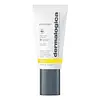What's inside
What's inside
 Key Ingredients
Key Ingredients

 Benefits
Benefits

 Concerns
Concerns

 Ingredients Side-by-side
Ingredients Side-by-side

Water
Skin ConditioningZinc Oxide
Cosmetic ColorantC12-15 Alkyl Benzoate
AntimicrobialOctyldodecyl Neopentanoate
EmollientButyloctyl Salicylate
Skin ConditioningCaprylic/Capric Triglyceride
MaskingIsododecane
EmollientLauryl PEG-8 Dimethicone
Propanediol
SolventNiacinamide
SmoothingMethylpropanediol
SolventCI 77891
Cosmetic ColorantSilica Silylate
EmollientLactic Acid
BufferingHelianthus Annuus Seed Oil
EmollientLavandula Angustifolia Flower/Leaf/Stem Extract
MaskingChamomilla Recutita Flower Extract
MaskingRosa Damascena Extract
MaskingChlorella Vulgaris Extract
Skin ConditioningSea Salt
AbrasiveOlive Oil Decyl Esters
Squalene
EmollientTocopherol
AntioxidantCaprylyl Glycol
EmollientLecithin
EmollientAllantoin
Skin ConditioningPropylene Glycol Stearate
Skin ConditioningGlycerin
HumectantBisabolol
MaskingLauryl PEG-10 Tris(Trimethylsiloxy)Silylethyl Dimethicone
EmulsifyingPEG-10
HumectantSilica
AbrasivePolyglyceryl-4 Diisostearate/Polyhydroxystearate/Sebacate
EmulsifyingMagnesium Stearate
Cosmetic ColorantTetrasodium Glutamate Diacetate
Citric Acid
BufferingSodium Hydroxide
BufferingSodium Chloride
MaskingBentonite
AbsorbentCellulose Acetate
Phenylpropanol
MaskingHydrated Silica
AbrasiveAcrylates/Ammonium Methacrylate Copolymer
Iron Oxides
Linalool
PerfumingWater, Zinc Oxide, C12-15 Alkyl Benzoate, Octyldodecyl Neopentanoate, Butyloctyl Salicylate, Caprylic/Capric Triglyceride, Isododecane, Lauryl PEG-8 Dimethicone, Propanediol, Niacinamide, Methylpropanediol, CI 77891, Silica Silylate, Lactic Acid, Helianthus Annuus Seed Oil, Lavandula Angustifolia Flower/Leaf/Stem Extract, Chamomilla Recutita Flower Extract, Rosa Damascena Extract, Chlorella Vulgaris Extract, Sea Salt, Olive Oil Decyl Esters, Squalene, Tocopherol, Caprylyl Glycol, Lecithin, Allantoin, Propylene Glycol Stearate, Glycerin, Bisabolol, Lauryl PEG-10 Tris(Trimethylsiloxy)Silylethyl Dimethicone, PEG-10, Silica, Polyglyceryl-4 Diisostearate/Polyhydroxystearate/Sebacate, Magnesium Stearate, Tetrasodium Glutamate Diacetate, Citric Acid, Sodium Hydroxide, Sodium Chloride, Bentonite, Cellulose Acetate, Phenylpropanol, Hydrated Silica, Acrylates/Ammonium Methacrylate Copolymer, Iron Oxides, Linalool
Isododecane
EmollientEthylhexyl Methoxycinnamate 6%
UV AbsorberDimethicone/Vinyl Dimethicone Crosspolymer
Skin ConditioningButyloctyl Salicylate
Skin ConditioningHomosalate 4%
Skin ConditioningEthylhexyl Salicylate 4%
UV AbsorberButyl Methoxydibenzoylmethane 2%
UV AbsorberPolysilicone-11
Bisabolol
MaskingCoffea Arabica Seed Extract
MaskingGlycyrrhiza Glabra Root Extract
BleachingChamomilla Recutita Flower Extract
MaskingRetinyl Palmitate
Skin ConditioningAloe Barbadensis Leaf Extract
EmollientCalluna Vulgaris Flower Extract
Skin ConditioningCamellia Sinensis Leaf Extract
AntimicrobialChlorella Vulgaris Extract
Skin ConditioningCaprylic/Capric Triglyceride
MaskingPhysalis Angulata Extract
Skin ProtectingPyrus Malus Fruit Extract
Skin ConditioningDiethylhexyl Syringylidenemalonate
Skin ProtectingIsododecane, Ethylhexyl Methoxycinnamate 6%, Dimethicone/Vinyl Dimethicone Crosspolymer, Butyloctyl Salicylate, Homosalate 4%, Ethylhexyl Salicylate 4%, Butyl Methoxydibenzoylmethane 2%, Polysilicone-11, Bisabolol, Coffea Arabica Seed Extract, Glycyrrhiza Glabra Root Extract, Chamomilla Recutita Flower Extract, Retinyl Palmitate, Aloe Barbadensis Leaf Extract, Calluna Vulgaris Flower Extract, Camellia Sinensis Leaf Extract, Chlorella Vulgaris Extract, Caprylic/Capric Triglyceride, Physalis Angulata Extract, Pyrus Malus Fruit Extract, Diethylhexyl Syringylidenemalonate
Ingredients Explained
These ingredients are found in both products.
Ingredients higher up in an ingredient list are typically present in a larger amount.
Bisabolol is famous for its skin soothing properties. It does this by blocking inflammatory signals, helping to reduce your body's reaction to irritation.
This ingredient also interferes with the process of hyperpigmentation. This can help with reducing dark spots and uneven tone.
Bisabolol is an antioxidant. Antioxidants help fight free-radicals. Free-radicals are molecules that may damage your skin cells. By fighting these free-radicals, Bisabolol may slow down signs of aging.
Studies have shown Bisabolol to have antimicrobial properties and may be a fungicide. These properties help preserve a product's shelf life.
All these properties makes bisabolol a great skin barrier helper ingredient.
Bisabolol also helps the absorption of other ingredients.
Note: Synthetic Bisabolol has been shown to be less effective.
Learn more about BisabololButyloctyl Salicylate is a chemical UV filter structurally similar to octisalate. It is a photostabilizer, SPF booster, emollient and solvent. This ingredient helps evenly spread out ingredients.
According to a manufacturer, it is suitable for pairing with micro Titanium Dioxide, Zinc Oxide, and pigments.
Photostabilizers help stabilize UV-filters and prevents them from degrading quickly.
Learn more about Butyloctyl SalicylateThis ingredient is an emollient, solvent, and texture enhancer. It is considered a skin-softener by helping the skin prevent moisture loss.
It helps thicken a product's formula and makes it easier to spread by dissolving clumping compounds.
Caprylic Triglyceride is made by combining glycerin with coconut oil, forming a clear liquid.
While there is an assumption Caprylic Triglyceride can clog pores due to it being derived from coconut oil, there is no research supporting this.
Learn more about Caprylic/Capric TriglycerideChamomilla Recutita Flower Extract comes from the Chamomile flower.
Chamomile is rich in antioxidants and has anti-inflammatory properties. Several compounds found in chamomile help with soothing, such as bisbolol.
Antioxidant components in chamomile make it an effective ingredient to help slow the signs of aging. Antioxidants help fight free-radical molecules, or molecules that may damage your skin.
Essential oils from chamomile have been found to improve wound healing due to its antimicrobial properties.
Ancient Greeks and Egyptians used Chamomile to treat skin redness and dryness. Chamomile has also been used to help treat stomach issues.
Learn more about Chamomilla Recutita Flower ExtractChlorella Vulgaris Extract comes from a green microalga. It is hydrating and contains antioxidants.
Studies also show Chlorella Vulgaris may help in rebuilding collagen and elastin. This ingredient is made up of lipids, carbohydrates, and chlorophyll.
Fun fact: This ingredient is commonly used as food additive in Japan.
Learn more about Chlorella Vulgaris ExtractIsododecane is a fragrance, emollient, and solvent.
As an emollient, it helps your skin stay soft and hydrated. Emollients help trap moisture into your skin.
Isododecane's role as a solvent makes it a great texture enhancer. It spreads smoothly on skin and does not leave a sticky feeling behind. Isododecane also helps prevent color transfer in makeup products.
Isododecane is not absorbed into skin.
Learn more about Isododecane